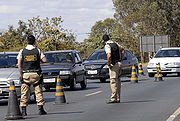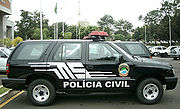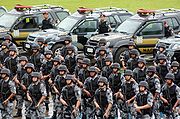
Policing in Brazil
Encyclopedia
In Brazil
, the Federal Constitution
establishes five different law enforcement institutions: the Federal Police
, the Federal Highway Police
, the Federal Railway Police
, the State Military Police and Fire Brigade, and the State Civil Police. Of these, the first three are affiliated to federal authorities and the latter two subordinated to state governments. All police institutions are part of the Executive branch of either federal or state government.
According to the Supreme Federal Tribunal
, the only security forces considered police units by Brazilian law are the ones listed in article 144 of the Federal Constitution, that is, the five aforementioned police forces.
There are two primary police functions: maintaining order
and law enforcement. When criminal offences affect federal entities, federal police forces carry out those functions. In the remaining cases, the state police forces undertake police activities.
 The first groups assigned with security duties in Brazilian territory date back to the early sixteenth century. Small, incipient units were designated in the Brazilian coastline, with the main function of fending off hostile foreign invaders. In 1566, the first police investigator of Rio de Janeiro
The first groups assigned with security duties in Brazilian territory date back to the early sixteenth century. Small, incipient units were designated in the Brazilian coastline, with the main function of fending off hostile foreign invaders. In 1566, the first police investigator of Rio de Janeiro
was recruited. By the seventeenth century, most "capitanias
" already had local units with law enforcement functions. On July 9, 1775 a Cavalry Regiment was created in Minas Gerais
for maintaining order. At the time, intense gold mining had attracted attention and greed of explorers, generating tensions in the area.
In 1808, the Portuguese royal family relocated to Brazil, due to the French
invasion of Portugal
. King João VI
sought to reshape the administrative structure of the colony. Among several reforms, he established the "Intendência Geral de Polícia" (General Police Intendancy), which merged police units with investigative functions, call currently of Civil Police
. He also created a Military Guard with police functions in 13 May 1809. This is considered a predecessor force of local military police units. Later, in 1831, when independence had already been declared, each province started organizing its local "military police", with order maintenance tasks.
In 31 January 1842, law 261 was enacted, reorganizing the investigative offices, the current "civil police".
The first federal police force, the Federal Railroad Police, was created in 1852.
Finally, in 1871, law 2033 separated police and judicial functions, creating the general bureaucratic structure and mechanisms still adopted nowadays by local police forces. In 1944, a federal police institution was created. The current Federal Police department was conceived on November 16, 1964. During the military dictatorship, some political police organizations were maintained, such as the DOI-CODI
.
Prevention and investigation in Brazil are divided between two distinct police organizations. Local "military police" forces only have order maintenance duties. Correspondingly, "civil police" institutions are responsible solely for crime investigation. However, at the federal level, the Federal Police is commissioned with both preventive and investigative functions of federal crimes.
 There are three federal police institutions in Brazil: the Brazilian Federal Police|Federal Police, the Federal Highway Police, and the Federal Railway Police.
There are three federal police institutions in Brazil: the Brazilian Federal Police|Federal Police, the Federal Highway Police, and the Federal Railway Police.

 There are two types of state police institutions: the Military Police and Military Firefighters Corps
There are two types of state police institutions: the Military Police and Military Firefighters Corps
and the Civil Police.

Candidates to military police lower ranks, such as 2nd class soldier (entry level), must meet a minimum of high school education.
In the civil forces, any police chief are required to hold a full degree in Law
and have law practicising experienced of, at least, three years.
Brazil
Brazil , officially the Federative Republic of Brazil , is the largest country in South America. It is the world's fifth largest country, both by geographical area and by population with over 192 million people...
, the Federal Constitution
Constitution of Brazil
During its independent political history, Brazil has had seven constitutions. The most recent was ratified on October 5, 1988.-Imperial Constitution :Background...
establishes five different law enforcement institutions: the Federal Police
Brazilian Federal Police
The Polícia Federal is the federal police force of Brazil subordinate to the Ministry of Justice, whose main assignments are the investigations of crimes against the Federal Government or its organs and companies, the combat of international drug trafficking and terrorism, and immigration and...
, the Federal Highway Police
Brazilian Federal Highway Police
The Brazilian Federal Highway Police is a federal law enforcement agency, subordinate to the Ministry of Justice, whose main function is fighting crime on Brazilian federal roads and highways, as well as monitoring and supervising vehicular traffic, although it has also taken on duties that go...
, the Federal Railway Police
Brazilian Federal Railroad Police
The Brazilian Federal Railroad Police or Federal Railway Police is a police agency founded in 1852 which is responsible for patrols and security on federal railways in Brazil.- History :...
, the State Military Police and Fire Brigade, and the State Civil Police. Of these, the first three are affiliated to federal authorities and the latter two subordinated to state governments. All police institutions are part of the Executive branch of either federal or state government.
According to the Supreme Federal Tribunal
Supreme Federal Tribunal
The Supreme Federal Court is the supreme court of Brazil, serving primarily as the Constitutional Court of the country. It is the highest court of law in Brazil for constitutional issues and its rulings cannot be appealed...
, the only security forces considered police units by Brazilian law are the ones listed in article 144 of the Federal Constitution, that is, the five aforementioned police forces.
There are two primary police functions: maintaining order
Social order
Social order is a concept used in sociology, history and other social sciences. It refers to a set of linked social structures, social institutions and social practices which conserve, maintain and enforce "normal" ways of relating and behaving....
and law enforcement. When criminal offences affect federal entities, federal police forces carry out those functions. In the remaining cases, the state police forces undertake police activities.
History

Rio de Janeiro
Rio de Janeiro , commonly referred to simply as Rio, is the capital city of the State of Rio de Janeiro, the second largest city of Brazil, and the third largest metropolitan area and agglomeration in South America, boasting approximately 6.3 million people within the city proper, making it the 6th...
was recruited. By the seventeenth century, most "capitanias
Captaincy
A captaincy is a historical administrative division of the former Spanish and Portuguese colonial empires. Each was governed by a captain general.-In the Portuguese Empire:...
" already had local units with law enforcement functions. On July 9, 1775 a Cavalry Regiment was created in Minas Gerais
Minas Gerais
Minas Gerais is one of the 26 states of Brazil, of which it is the second most populous, the third richest, and the fourth largest in area. Minas Gerais is the Brazilian state with the largest number of Presidents of Brazil, the current one, Dilma Rousseff, being one of them. The capital is the...
for maintaining order. At the time, intense gold mining had attracted attention and greed of explorers, generating tensions in the area.
In 1808, the Portuguese royal family relocated to Brazil, due to the French
France
The French Republic , The French Republic , The French Republic , (commonly known as France , is a unitary semi-presidential republic in Western Europe with several overseas territories and islands located on other continents and in the Indian, Pacific, and Atlantic oceans. Metropolitan France...
invasion of Portugal
Portugal
Portugal , officially the Portuguese Republic is a country situated in southwestern Europe on the Iberian Peninsula. Portugal is the westernmost country of Europe, and is bordered by the Atlantic Ocean to the West and South and by Spain to the North and East. The Atlantic archipelagos of the...
. King João VI
John VI of Portugal
John VI John VI John VI (full name: João Maria José Francisco Xavier de Paula Luís António Domingos Rafael; (13 May 1767 – 10 March 1826) was King of the United Kingdom of Portugal, Brazil and the Algarves (later changed to just King of Portugal and the Algarves, after Brazil was recognized...
sought to reshape the administrative structure of the colony. Among several reforms, he established the "Intendência Geral de Polícia" (General Police Intendancy), which merged police units with investigative functions, call currently of Civil Police
Civil Police of Rio de Janeiro State
The Civil Police of Rio de Janeiro State is the police force responsible for criminal investigations in Rio de Janeiro - Brazil...
. He also created a Military Guard with police functions in 13 May 1809. This is considered a predecessor force of local military police units. Later, in 1831, when independence had already been declared, each province started organizing its local "military police", with order maintenance tasks.
In 31 January 1842, law 261 was enacted, reorganizing the investigative offices, the current "civil police".
The first federal police force, the Federal Railroad Police, was created in 1852.
Finally, in 1871, law 2033 separated police and judicial functions, creating the general bureaucratic structure and mechanisms still adopted nowadays by local police forces. In 1944, a federal police institution was created. The current Federal Police department was conceived on November 16, 1964. During the military dictatorship, some political police organizations were maintained, such as the DOI-CODI
DOI-CODI
The Destacamento de Operações de Informações - Centro de Operações de Defesa Interna was the Brazilian intelligence and repression agency during the military government . This period started on March 31, 1964 with the removal of the civilian government by military forces and ended in the 1984....
.
Primary functions
Law enforcement and maintaining order are the two primary functions of Brazilian police units. In Brazilian Law, maintaining order is considered a preventive effort whereby police troopers patrol the streets to protect citizens and discourage criminal activity. Law enforcement consists of criminal investigation, therefore taking place after a criminal offence.Prevention and investigation in Brazil are divided between two distinct police organizations. Local "military police" forces only have order maintenance duties. Correspondingly, "civil police" institutions are responsible solely for crime investigation. However, at the federal level, the Federal Police is commissioned with both preventive and investigative functions of federal crimes.
Federal institutions

- The Federal PoliceBrazilian Federal PoliceThe Polícia Federal is the federal police force of Brazil subordinate to the Ministry of Justice, whose main assignments are the investigations of crimes against the Federal Government or its organs and companies, the combat of international drug trafficking and terrorism, and immigration and...
, officially the "Departamento de Polícia Federal", is described by the Constitution as "a permanent administrative organ of the federal ExecutiveExecutive (government)Executive branch of Government is the part of government that has sole authority and responsibility for the daily administration of the state bureaucracy. The division of power into separate branches of government is central to the idea of the separation of powers.In many countries, the term...
branch".Main assignments are the investigations of crimes against the Federal Government or its organs and companies, the combat of international drug trafficking and terrorism, and immigration and border control police (includes airport and water police).It is directly subordinated to the Ministry of Justice.
- The Federal Highway PoliceBrazilian Federal Highway PoliceThe Brazilian Federal Highway Police is a federal law enforcement agency, subordinate to the Ministry of Justice, whose main function is fighting crime on Brazilian federal roads and highways, as well as monitoring and supervising vehicular traffic, although it has also taken on duties that go...
, also described as "a permanent administrative organ of the federal Executive branch", has the main function of patrolling federal highwayHighwayA highway is any public road. In American English, the term is common and almost always designates major roads. In British English, the term designates any road open to the public. Any interconnected set of highways can be variously referred to as a "highway system", a "highway network", or a...
s. It maintains order, but does not investigate crime.
- The Federal Railway PoliceBrazilian Federal Railroad PoliceThe Brazilian Federal Railroad Police or Federal Railway Police is a police agency founded in 1852 which is responsible for patrols and security on federal railways in Brazil.- History :...
, the third and last federal police force. Like the previously mentioned institutions, the Federal Railway Police is described as "a permanent administrative organ of the federal Executive branch" with the main function of patrollingPatrollingPatrolling is a military tactic. Small groups or individual units are deployed from a larger formation to achieve a specific objective and then return. The tactic of patrolling may be applied to ground troops, armoured units, naval units, and combat aircraft...
the federal railway system. It does not investigate crime, solely focusing on order maintenance.
State institutions


Military Firefighters Corps
In Brazil, the Military Firefighters Corps is a military organization with the mission of civil defense, firefighting, and search and rescue inside the States of the Federation. Since 1915, it has been a Military reserve force and an auxiliary force of the Brazilian Army. The Military Firefighter...
and the Civil Police.
- The Military Police and Fire Brigade is the state police with order maintenance functions. It patrols the streets and imprisons suspects of criminal activity, handing them over to Civil Police custody or, in case of federal crimes, to the Federal Police. It is a "militarized" institution (gendarmerie) because it is based on military principles of hierarchy, ranks, uniform, discipline, and ceremonial. However, it is not part of the Brazilian Armed Forces. It is described by the Constitution as an "ancillary force of the Army". The Military Fire Brigade, in general, is a part of the Military Police, although it does not perform traditional policing duties. It is subordinated to the state government.
- The Civil Police is the state police with law enforcement duties. It has the function of investigating crimes committed in violation of Brazilian criminal law. It does not patrol the streets and does not use uniforms. Like the Military Police, it is subordinated to the state government.
Other security forces

- Municipalities may create Municipal Guards. They have the duty of protecting property, services and facilities of local governments. They are not police institutions and do not have order maintenance or law enforcement obligations. Thus, they are not listed in article 144 of the Federal Constitution as an autonomous police unit. There are over 700 Municipalities with Municipal Guards.
- The National Public Security Force, officially the Força Nacional de Segurança Pública, was created by presidential decree 5.289 on November 29, 2004. It is not a security force per se. Rather, it is a federal program of cooperation among all Brazilian police forces for situations of emergency or exceptional nature.
- Army, Navy and Air Force police units are not to be confused with the state Military Police. These are internal security units of each Armed Forces branch. They do not have general order maintenance or law enforcement functions. Other internal units may be created for protection of particular agencies or administrative entities, such as the guards of legislative houses, which are not police institutions. Nevertheless, in times of emergency, the ArmyBrazilian ArmyThe Brazilian Army is the land arm of the Brazilian Military. The Brazilian Army has fought in several international conflicts, mostly in South America and during the 19th century, such as the Brazilian War of Independence , Argentina-Brazil War , War of the Farrapos , Platine War , Uruguayan War ...
has been called upon to maintain order, most notably in Rio de Janeiro.
Entry qualification
Access to all positions under any military police forces encompasses written knowledge tests, previous and further medical exams, physical strength, agility and endurance tests and, finally, psychological interviews and evaluation. When approved on all tests, the candidate will be considered fit to military police service and admitted in special training courses (CTSP, to graduate soldiers, and the CFO, to graduate aspiring high-ranked officials). There's a minimum entry age of 18 years-old and, with few variations, a maximum entry age of 30 years-old.Candidates to military police lower ranks, such as 2nd class soldier (entry level), must meet a minimum of high school education.
In the civil forces, any police chief are required to hold a full degree in Law
Law
Law is a system of rules and guidelines which are enforced through social institutions to govern behavior, wherever possible. It shapes politics, economics and society in numerous ways and serves as a social mediator of relations between people. Contract law regulates everything from buying a bus...
and have law practicising experienced of, at least, three years.
See also
- Crime in BrazilCrime in BrazilCrime in Brazil involves an elevated incidence of violent and non-violent crimes. According to most sources, Brazil possesses high rates of violent crimes, such as murders and robberies; the homicide rate has been steadily declining, but it is still above 20.0 homicides per 100,000 inhabitants,...
- Brazilian Federal PoliceBrazilian Federal PoliceThe Polícia Federal is the federal police force of Brazil subordinate to the Ministry of Justice, whose main assignments are the investigations of crimes against the Federal Government or its organs and companies, the combat of international drug trafficking and terrorism, and immigration and...
- Military Police of Brazilian States
- Civil Police of Brazilian States
- Brazilian Intelligence AgencyAbinAbin may refer to:* Abin Sur, a fictional character* R. Abin I, Jewish Talmudist* R. Abin II, Jewish Talmudist* Jose ben Abin, Jewish Talmudist* Abin Naggara, Jewish Talmudist* Idi b. Abin Abin Naggara, Jewish Talmudist...
External links
- "Brazilian Federal Police" (Portuguese)
- "Rio de Janeiro Military Police" (Portuguese)
- "Rio de Janeiro Civil Police" (Portuguese)
- "São Paulo Military Police" (Portuguese)
- "São Paulo Civil Police" (Portuguese)
- "Minas Gerais Military Police" (Portuguese)
- "Minas Gerais Civil Police" (Portuguese)

